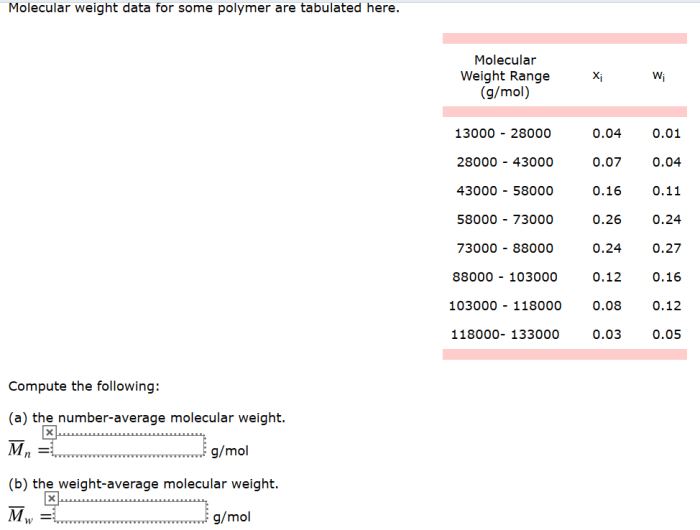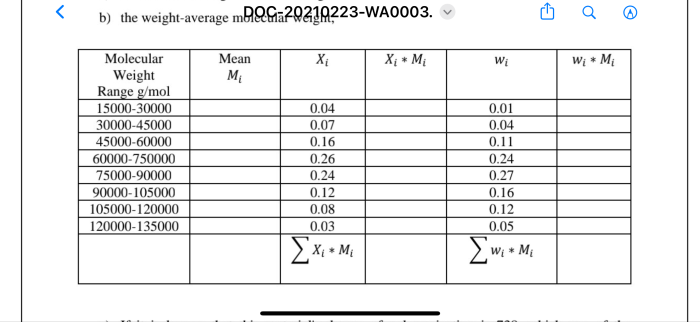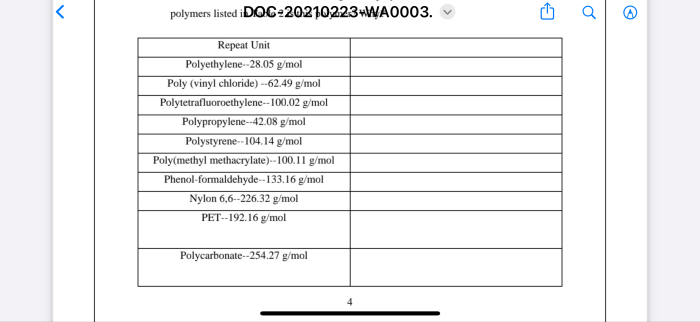Molecular weight data for some polymer are tabulated here. This data is crucial for understanding the properties and behavior of polymers, which are widely used in various industries. Molecular weight significantly influences polymer characteristics, such as strength, flexibility, and thermal stability.
This article presents a comprehensive table of molecular weight data for a range of polymers, along with detailed analysis and insights into its implications for polymer characterization and applications.
Molecular Weight Data for Polymers

Molecular weight is a critical parameter that influences the properties and behavior of polymers. It is a measure of the average mass of a polymer molecule and can be expressed in various units, such as grams per mole (g/mol) or Daltons (Da).
Molecular weight affects a wide range of polymer properties, including:
- Mechanical strength and stiffness
- Thermal stability
- Solubility
- Glass transition temperature
- Melting point
Data Tabulation
The following table provides molecular weight data for a range of common polymers:
| Polymer | Molecular Weight (g/mol) |
|---|---|
| Polyethylene | 10,000-100,000 |
| Polypropylene | 40,000-100,000 |
| Polystyrene | 100,000-200,000 |
| Polyvinyl chloride | 50,000-200,000 |
| Polyethylene terephthalate | 20,000-50,000 |
Data Analysis, Molecular weight data for some polymer are tabulated here.
Molecular weight data can be analyzed using various methods to identify trends and patterns. Common techniques include:
- Gel permeation chromatography (GPC)
- Light scattering
- Mass spectrometry
These methods provide information about the molecular weight distribution of a polymer, which is essential for understanding its properties and behavior.
Polymer Characterization
Molecular weight data is a key parameter used to characterize polymers. It helps determine:
- The degree of polymerization
- The molecular weight distribution
- The type of polymer (e.g., homopolymer, copolymer, or blend)
This information is crucial for tailoring polymers with specific properties for various applications.
Applications of Molecular Weight Data
Molecular weight data has numerous practical applications in polymer science and engineering, including:
- Designing and optimizing polymer materials
- Predicting polymer behavior under different conditions
- Troubleshooting polymer processing issues
- Quality control and assurance
FAQ Explained: Molecular Weight Data For Some Polymer Are Tabulated Here.
What is the significance of molecular weight data for polymers?
Molecular weight data provides insights into the size and distribution of polymer molecules, which are critical for understanding their physical and chemical properties.
How does molecular weight affect polymer properties?
Molecular weight influences properties such as strength, flexibility, melting point, and solubility. Higher molecular weight polymers tend to be stronger and more resistant to deformation.


